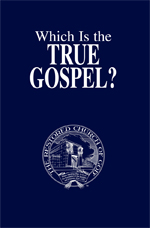 Lightstock
Lightstock
Article
Many see the virus as a message from God, but do not agree on what that message is.
Learn the why behind the headlines.
Subscribe to the Real Truth for FREE news and analysis.
Subscribe NowThe novel coronavirus has rattled the globe, causing economic hardship for millions and killing more than 800,000 Americans. As the pandemic and the restrictions that came with it stretch into their second year, we are left to consider deeper implications of the virus.
A poll by the University of Chicago Divinity School and The Associated Press-NORC Center for Public Affairs Research revealed that people searched for greater meaning behind the devastating outbreak. This is not unusual when times are hard or crises cannot simply be overcome with human ingenuity.
According to the poll, the coronavirus has prompted almost two-thirds of American believers of all faiths to feel that God is telling humanity to change how it lives.
The survey found that 62 percent of Americans who believe in God feel either strongly or somewhat that the virus is a sign of God telling humanity to change.
The question was posed to those who believe in God across all faiths showing a connection with their belief in God and the still uncurable virus. Scientists have yet to fully figure out the disease.
An article in The New Yorker not only explained the understood elements of the virus but revealed how the disease still leaves them confounded: “The shortness of breath that’s most characteristic of COVID-19 is reasonably well understood. It originates in the gossamer air sacs of the lungs, called alveoli, where blood and air are separated by such thin membranes that oxygen and carbon dioxide can pass into and out of the bloodstream, respectively.”
The article continued explaining how the coronavirus causes many of the lung’s 600 million alveoli to collapse or fill with fluid preventing precious oxygen from getting into the blood. But experts are baffled by the fact COVID-19 is not purely a respiratory disease.
“When future generations look back on this pandemic, its iconic symbol will probably be the ventilator. But, although respiratory problems are at the core of the disease, COVID-19 has revealed itself to be more than a straightforward viral pneumonia…COVID-19 can push kidneys into failure, send the body’s immune system into catastrophic overdrive, and cause blood clots that impede circulation to the lungs, heart, or brain. It’s a disease of remarkable complexity, which even the most experienced doctors are struggling to understand” (ibid.).
How do doctors and medical scientists fight a viral enemy so different from anything they have seen?
The World Health Organization believes the mortality rate of COVID-19 can differ, ranging from 0.7 percent to up to 4 percent, depending on the quality of the health care system where it is treated. In comparison, influenza has a. 002 percent mortality rate. COVID-19 is undoubtedly a killer not seen in recent memory.
Despite all the world’s resources and attention, society has yet to conquer the virus, bringing the world to an abrupt halt as a result. This left many to look beyond themselves. For the majority in the recent survey, God is the only explanation.
Reaction to Virus
The coronavirus has affected the entire American way of life. Earlier generations had the Great Depression and World War I and II. The Cold War and conflict in Vietnam impacted those in later decades.
COVID-19 is arguably the generational crisis of this age.
Vaccinations have helped prevent the spread of the disease and reduce the severity of symptoms to those who have access to them. Yet there are still many nations across the globe that lack the ability to distribute medical goods equitably.
This may help explain why those in poorer communities or without access to good medical care make a stronger connection between God and the virus. It is just one fact of many that demonstrate people look beyond this world when they cannot solve their problems.
Most houses of worship stopped in-person services to help protect public health as the virus spread. However, many refused to allow the virus to keep them from expressing their faith. They viewed their worship services online or listened to preachers in parking lots while staying in their cars.
Even some who do not affiliate with organized religion, such as Lance Dejesus of Dallastown, Pennsylvania, saw a bigger message in the virus.
“It could be a sign, like ‘hey, get your act together’—I don’t know,” said Mr. Dejesus, 52, who said he believes in God but does not consider himself religious. “It just seems like everything was going in an OK direction and all of a sudden you get this coronavirus thing that happens, pops out of nowhere.”
Overall, 82 percent of Americans say they believe in God. This number is surprising given how much society focuses on atheism and amorality. A quarter, 26 percent, say their sense of faith or spirituality has grown stronger as a result of the outbreak. Just 1 percent say it has weakened.
Kathryn Lofton, a professor of religious studies at Yale University, interpreted the high number of Americans perceiving the virus as a message from God as an expression of “fear that if we don’t change, this misery will continue.”
“When people get asked about God, they often interpret it immediately as power,” said Ms. Lofton, who collaborated with researchers from the University of Chicago and other universities, along with The Associated Press, on the design of the new poll. “And they answer the question saying, ‘Here’s where the power is to change the thing I experience.’”
This undeniably demonstrates a connection between God and the virus. Some believe it contains a long overdue message.
What Is the Message?
Several messages can be attributed to the pandemic, depending on your viewpoint or circumstances.
One could be of hope.
The opposite of hope is despair. Times of crisis present the opportunity for us to display hope through acts of kindness and generosity. God could be showing us that we are much better as a civilization when we pull together in times of need.
The virus was severe enough to make us focus on others instead of just ourselves. The extraordinary love and outgoing concern for others during the crisis was obvious. People gave every bit of themselves for the sake of others. Those from all walks of life pulled together to help their neighbors. Doctors and nurses gave their all. First responders put themselves at risk. Government workers tirelessly worked to keep facilities germ free. The way people sacrificed in a society generally considered selfish was unprecedented. The onset of the virus sent a clear message of hope for humanity in the right circumstances.
Another message is one of punishment. Some see the virus and its impact as proof that God is angry.
After all, some say, most in the world are disobedient and out for themselves. They routinely ignore God. They ignore His Ten Commandments. God is offended when people worship false gods, use His name in vain, or break His Sabbath. God is not pleased when people disrespect their parents, commit adultery, kill, steal, lie, and covet what belongs to someone else.
The book of II Timothy gives a long list of bad conduct in our time: “For men shall be lovers of their own selves, covetous, boasters, proud, blasphemers, disobedient to parents, unthankful, unholy, without natural affection, trucebreakers, false accusers, incontinent, fierce, despisers of those that are good, traitors, heady, highminded, lovers of pleasures more than lovers of God” (3:2-4).
To many, these terrible behaviors deserve punishment, and the coronavirus is a plague sent by God for that purpose.
Yet another message could be that the coronavirus is a clear consequence for breaking God’s dietary laws of clean and unclean meats. What people eat may seem inconsequential, but when several of the world’s worst diseases such as Ebola and swine flu are connected to unclean animals that are consumed by humans, the connection is hard to ignore.
The consensus on the coronavirus is that it originated in a meat market filled with items not intended to be eaten including items routinely consumed raw. Was the virus a result of disobeying God’s laws on health and thus a strong message from Him to change our diets?
Other messages can be gleaned from the virus, but one divine message from God to mankind is undeniable: I exist and without Me you will never fully resolve your problems and realize the abundant life I have in store for you (John 10:10).
This is a clear message God has been sending to mankind for thousands of years through the challenges of previous pandemics, war, weather upsets and other catastrophes.
Individuals usually do not pay attention in time of prosperity or when things are going well. It takes adversity for them to truly consider (Ecc. 7:14).
The coronavirus is the latest adversity putting everyone on notice. Some are suffering from the disease itself. Others are watching loved ones become ill. Millions have lost their source of income despite not contracting the virus or knowing anyone who has. People, who thrive on social contact, were forbidden to interact with one another in meaningful ways due to stifling rules and regulations.
All in all, it is not life as God intended. The virus is a reminder to not only stop and think of Him, but also to look to Him if we ever want to get to the bottom of solving this and future problems.
This divine message must be received loud and clear.



